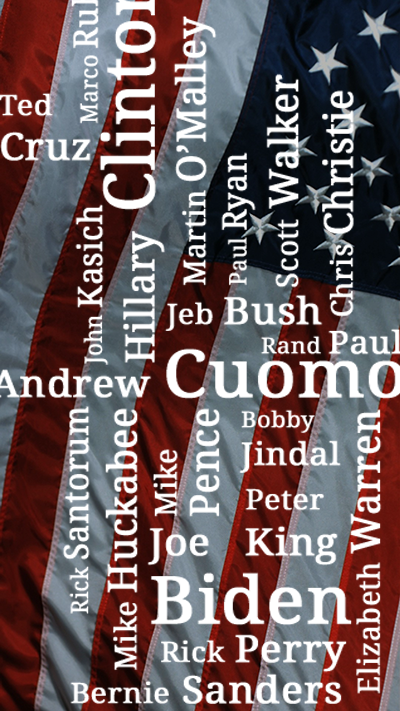
New Hampshire Poll Yields 2016 Insights
Bloomberg Politics paired with St. Anselm College to conduct a poll on the state of the 2016 presidential campaign in New Hampshire. Two separate articles in Bloomberg, one focused on Democrats, another on Republicans, provide important insights into where the race for each party’s nomination stands:
No Groundswell for Biden in New Hampshire: Bloomberg Politics/Saint Anselm Poll
Vice President Joe Biden trails the two leading candidates for the Democratic presidential nomination by more than 25 points each in New Hampshire and would enter the race without an edge over them on overall favorability or specific personality traits.
Biden would draw the support of 10 percent of likely Democratic primary voters if the primary were held today, according to the Bloomberg Politics/Saint Anselm New Hampshire Poll released Tuesday. That puts him well behind Vermont Senator Bernie Sanders, who's led most recent polls in the state that neighbors his own, who gets the support of 41 percent of those surveyed, and former Secretary of State Hillary Clinton, who's at 36 percent. When Democrats first and second choices for the party's nominee are combined, Clinton edges Sanders: 64 percent of Democrats rank Clinton as either their No. 1 or No. 2 choice for the nomination. For Sanders, the number is 63 percent; for Biden, 29 percent.
The two other Democrats in the race, former Rhode Island Gov. Lincoln Chafee and former Maryland Gov. Martin O’Malley both registered zero support in the state, although O’Malley at least is the second choice of six percent of Democrats. The article suggests a late entry by Biden would face an uphill climb in New Hampshire:
Thirty-six percent of Democratic primary voters surveyed say that Biden's drawn out decision-making process made them less supportive of him, while 62 percent say it doesn't matter to them.
Biden has signaled that his bid would ride on the successes and popularity of President Barack Obama, who got favorable ratings from 83 percent of the New Hampshire Democrats surveyed. Biden's 75 percent favorability rating put him behind both former President Bill Clinton (78 percent) and Hillary Clinton (77 percent). The differences are more pronounced among those voters who feel most strongly: Obama got "very favorable" ratings from 50 percent of New Hampshire Democrats. For Hillary Clinton, that number is 40 percent. For Biden, 29 percent. The highest favorability rankings went to Sanders, from neighboring Vermont: 86 percent rated him favorably and 55 percent "very favorable."
On questions of personality and ability to govern, the vice president generally trails Clinton and Sanders.
Over on the Republican side, businessman Donald Trump and retired neurosurgeon Ben Carson continue to lead the field. The article suggests an ad buy on behalf of former Florida Gov. Jeb Bush has failed to push him closer to the frontrunners:
A month of extensive New Hampshire advertising on Jeb Bush's behalf has failed to boost his support and likely Republican primary voters there view him as inferior to frontrunner Donald Trump on most key attributes.
A new Bloomberg Politics/Saint Anselm New Hampshire Poll also shows Bush's favorability rating among the state's Republican primary voters has dropped to its lowest level—57 percent—since the survey was first taken almost a year ago.
In the horse race, the former Florida governor has seen his overall support drop to 10 percent, from 11 percent in May. That puts him in third place, behind Trump at 24 percent and retired neurosurgeon Ben Carson at 17 percent, despite an advertising push by the pro-Bush Right to Rise super political action committee that has dominated the state's television screens for the past four weeks.
“With such a heavy spend, the Bush campaign was undoubtedly hoping for a bounce,” said Doug Usher of Washington-based Purple Strategies, which conducted the poll Oct. 15-18. “But their candidate is closer to Rubio, Fiorina and Kasich than to the top tier, and his favorables are moving in the wrong direction.”
It’s fair to say Bush can’t be thrilled with where he is in the poll, but he still leads (barely) the pack of candidates trailing Trump and Carson, which is preferable to his national standing at the moment (fifth place according to the RealClearPolitics.com average, trailing Sens. Ted Cruz of Texas and Marco Rubio of Florida).
The poll included questions about several of the candidate’s potential weaknesses or vulnerabilities, which provides some sense of how difficult or easy it may be for them to surmount their challenges. The news is probably best for Rubio:
Rubio's youthfulness isn't much of a concern, with 87 percent saying they're not bothered that the 44-year-old would be the third-youngest president if elected.
Cruz, on the other hand, may have some problems:
When told that Cruz has "repeatedly led the charge for government shutdowns for his own political advantage," 52 percent of Republican primary voters say they're less supportive of him, while 41 percent say it doesn't concern them.
Trump’s habit of attacking his opponents in harsh terms seems to cut both ways, with New Hampshire Republicans “nearly evenly divided” on whether it made them more or less likely to support him. Bush has similar numbers on his support for legal status for illegal aliens and Common Core. His father and brother having both been president doesn’t seem to be a problem, however.
The poll offers a good look at where the race stands right now, as well as what is likely to shape it going forward and what candidates must do to move up or avoid being pushed even further down.



